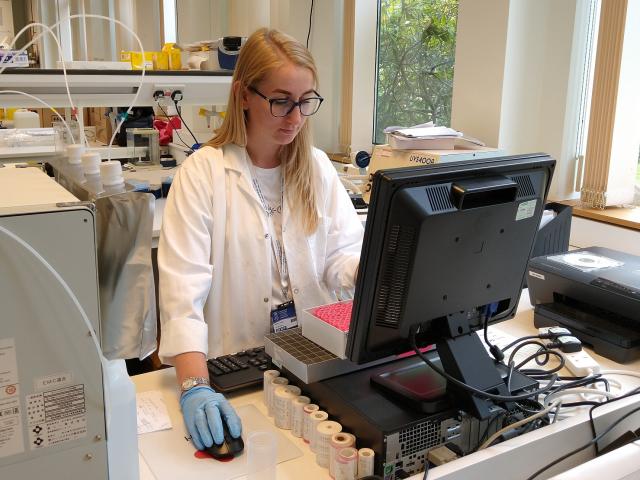
Adapting and evolving – how the Diabetes Research Group Swansea Laboratory is continuing vital diabetes research through the pandemic
The last year has been a huge challenge for every area of health and care research, with many professionals facing redeployment on to urgent public health studies relating to COVID-19.
The Diabetes Research Group Swansea Laboratory, part funded by Health and Care Research Wales, was no different. The team had to adapt key projects whilst alternative ways of working in the lab were found, and even helped support first-of-its-kind COVID-19 vaccine study Medicago.
We first spoke to the laboratory in 2019, to find out more about the ‘Michelin star’ standard diabetes work taking place behind closed doors. We caught up with Dr Gareth Dunseath, lab manager, to find out how the team has adapted, and in some areas, improved practice for the better.
“We’re pretty unique here,” explained Gareth. “We offer what we call an ‘end-to-end’ service whereas a lot of labs will just do individual aspects of the process, like the analysis.
“The fact we can be involved right at the start to give advice on study set up and protocol writing, organise the logistics, do the analysis, report the results and get involved in the statistics side of things as well, makes us special.”
The lab has continued to support two large diabetes research trials throughout the pandemic; the Ustekid and CLOuD studies, which both look at therapies for Type 1 diabetes. As these two studies were deemed to be of such high importance to the diabetes research effort, the laboratory staff were among the first to return to the Swansea University campus during the restrictions.
“The COVID-19 enforced restrictions made this challenging, however the team has been able to work with the study teams to adapt some study procedures to enable them to continue,” said Gareth.
“For example, by changing how we collect blood samples from a needle in the arm to a finger prick method, certain key study visits could be performed from home. Some of the adaptations to the study procedures may now guide future study designs, allowing greater convenience for study participants.”
The Lab was also chosen to provide lab support to the Medicago COVID-19 vaccine study, being run through the Joint Clinical Research Facility in Swansea.
“The Diabetes Research Group Swansea lab staff have been working alongside the trial nurses on study visits where blood sampling is taking place, to receive the blood samples and ensure that they are processed and frozen as efficiently and quickly as possible,” explained Gareth.
“The samples are then stored frozen at -80°C in our lab with their locations logged onto the lab’s online sample tracking software, before periodically being transferred on dry ice to the trial’s central lab ready for analysis.”
As well as providing invaluable support to COVID-19 research, Gareth has hopes to support more new trials and technologies in the future:
“Going forwards, as the restrictions placed on us by the pandemic begin to relax, I see the lab continuing to support current, and more importantly, new trials, studying both pharmacological therapies and novel technologies.
“By using what we’ve learned from the challenges of having to adapt a number of our procedures due to the restrictions, the lab will be in a strong position to show a continual improvement in the quality of support we are able to provide.”
The lab is one of around 50 sites in the world that has Good Clinical Laboratory Practice (GCLP) accreditation. It shows commercial companies and other collaborators that Gareth and the team here – which is made up of lab director Professor Steve Luzio, quality facilitator Sarah Dowrick and research technician Evie Bain – work to the highest standards.
The lab is audited every two years to make sure the GCLP standards are being met. The team are currently going through the re-accreditation process again; although, due to the current restrictions, this is being conducted in a different way. There will be no on-site visit this time, instead a thorough questionnaire, document reviews and video meetings.
“It’s not a big lab at all but we know this is just us,” said Gareth. “We know things are maintained properly and everyone who uses the lab is appropriately trained. You’re not going to turn up one day and find someone who you don’t know using your kit.
“We hold samples here that are very precious resources to study groups and I think they like the confidence that those samples are behind lock and key.
“I think more and more grant organisations require GCLP accreditation. A lot of research centres might have lab facilities but they don’t have the accreditation, so they come to us. And they keep coming back. We’re the lab of choice.”